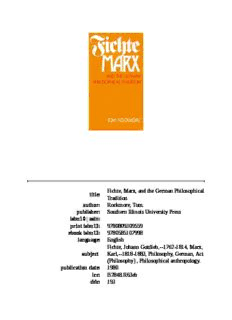
Fichte, Marx, and the German philosophical tradition PDF
Preview Fichte, Marx, and the German philosophical tradition
Fichte, Marx, and the German Philosophical title: Tradition author: Rockmore, Tom. publisher: Southern Illinois University Press isbn10 | asin: print isbn13: 9780809309559 ebook isbn13: 9780585107998 language: English Fichte, Johann Gottlieb,--1762-1814, Marx, subject Karl,--1818-1883, Philosophy, German, Act (Philosophy) , Philosophical anthropology. publication date: 1980 lcc: B2848.R63eb ddc: 193 Fichte, Johann Gottlieb,--1762-1814, Marx, subject: Karl,--1818-1883, Philosophy, German, Act (Philosophy) , Philosophical anthropology. Page i Page iii Fichte, Marx, and the German Philosophical Tradition Tom Rockmore SOUTHERN ILLINOIS UNIVERSITY PRESS Carbondale and Edwardsville FEFFER & SIMONS, INC. London and Amsterdam Copyright © 1980 by Southern Illinois University Press All rights reserved Printed in the United States of America Designed by Richard Hendel Library of Congress Cataloging in Publication Data Rockmore, Tom, 1942 Fichte, Marx, and the German philosophical tradition. Bibliography: p. Includes index. I. Fichte, Johann Gottlieb, 17621814. 2. Marx, Karl, 18181883. 3. Philosophy, German. 4. Act (Philosophy). 5. Philosophical anthropology. I. Title. B2848.R63 193 80-13194 ISBN 0-8093-0955-6 Page v Contents Acknowledgments vii Chapter 1. On Comparing the Positions of Fichte and 1 Marx Chapter 2. Fichte's Theory of Man as Active Self 6 Chapter 3. Philosophy and Political Economy: Marxian 28 Theory of Man Chapter 4. Activity in Fichte and Marx 53 Chapter 5. Activity and Man 72 Chapter 6. Theory and Metatheory 96 Chapter 7. Aspects of the Historical Relation 120 Chapter 8. Beyond Fichte and Marx 145 Chapter 9. Man as an Active Being 161 Notes 167 Selected bibliography 191 Index 203 Page vii Acknowledgments My debts are too numerous to detail, but the most important ones should be mentioned. My greatest debt is to John Lachs, who interested me in this topic and suggested the relevance of Aristotelian activity. I should also like to acknowledge the encouragement of my colleague, John E. Smith, the secretarial aid of Anne Granger, and the help of my wife, Sylvie. I am further grateful to my colleague, Seyla Benhabib, and especially to Dick Howard for detailed comments on an earlier version. The award of a Morse Fellowship from Yale University freed me from teaching duties during the academic year 197475, and enabled me to do research in Heidelberg where much of the writing was done. An award from the Griswold Fund defrayed expenses in the preparation of the manuscript. The present study is the result of several years of reflection, during which my understanding of Fichte, Marx, and their relation has matured. A small portion of the discussion has already appeared in print in article form. I refer to the following two papers: "Activity in Fichte and Marx," in Idealistic Studies 6 (May 1976) and "Fichte's Idealism and Marx's Materialism," in Man and World 8, no. 2 (May 1975). I thank the editors of these journals for permission to reprint the very few passages I have not seen fit to rethink or at least to rewrite. T. R. NEW HAVEN, CONNECTICUT JANUARY 1980 Page 1 Chapter 1 On Comparing the Positions of Fichte and Marx Mir hilft der Geist! Auf einmal seh ' ich Rat. Und schreibe getrost: im Anfang war die Tat. Goethe, Faust I Tätig zu sein, sagte er, ist des Menschen erste Bestimmung, und alle Zwischenzeiten, in denen er auszuruhen genötigt ist, sollte er anwenden, eine deutliche Erkenntnis der äusserlichen Dinge zu erlangen, die ihm in der Folge abermals seine Tätig keit erleichtert. Goethe, Wilhelm Meisters Lehrjahre, bk. 6 My intention in this book is to compare aspects in the positions of Fichte and Marx, two thinkers often but mistakenly viewed at opposite ends of the intellectual spectrum, in order to disclose an important and largely unsuspected parallel. The discussion of this parallel will develop in two ways, thematically in terms of analysis of several related concepts in the two positions, and historically with respect to the genesis of the parallel in the wider context of the nineteenth-century German tradition. The presence of a relation between the two positions is by no means obvious. Fichte was a professional philosopher, writing in the Kantian tradition, and interested in the epistemological concerns which constitute a major strand of the modern philosophical tradition. Although Marx received extensive philosophical training, he was not a professional philosopher. His thought cannot be labeled as philosophy without further qualification, since after an early brush with Hegelianism he professed to abandon the realm of abstract thought for the more concrete terrain of political economy. It further seems difficult to relate Fichte and Marx in terms
Description: